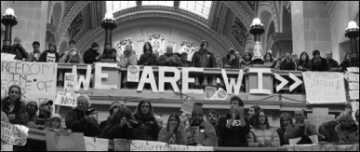Workers, students and activists have been pursuing an intensive campaign of direct action in response to attempts by recently elected Republican Governor Scott Walker’s to shatter public sector unions by withdrawing collective bargaining rights. In a clear attempt to break the influence of the unions within the public sector entirely, Walker has forced through a bill which would not just remove collective bargaining, but legally cap pay increases, abolish union dues check-off and require annual union recognition elections – all this after unions accepted all of Walker’s other demands, including a significant paycut.
The bill targets every Wisconsin state worker, with the exception of the police and fire service. However, despite their exemption from the bill, there has been much solidarity evident from firefighters and even in some cases, the police too.
The attempts to stop the bill’s passage had been wide ranging, including strikes and ‘sick-outs’ by public sector workers - with schools across the state closing for several days, the state Capitol building in near perpetual occupation, massive demonstrations and even Democrat state senators and representatives literally fleeing the state as they attempt to block the passage of the bill by leaving the state legislature inquorate.
Despite having a long tradition of workers militancy and a proud union tradition, Wisconsin has recently seen several huge attacks on the working class – for example, having one of the most punitive anti-welfare schemes – with recent programmes cutting the numbers receiving welfare by up to 90% without creating any more jobs. These are the schemes which the current government in the UK seeks to import.
The new bill is seen by many as the American right testing the waters with extreme anti-working class measures in the wake of the financial crisis. It is widely thought that if they are able to get away with it in Wisconsin then similar attacks in other states will quickly follow – already similar legislation is being pushed in Ohio, which many commentators see as going even further than that proposed in Wisconsin, for example not even exempting the police. While the resistance has in many ways been inspiring, many question whether there is the ability to go the full way – at present the movement has largely kept within the bounds of “acceptable action”, and has received support from much of the Democratic Party.
There is also the problem that the unions had already aceded to almost all of Walker’s demands – it was only at the point where their very place at the bargaining table was threatened that they felt the need to take any action. With the passage of the bill, more radical union elements have been calling for a state-wide general strike, something which would represent a significant escalation of the already high stakes struggle. However, this looks unlikely as long as union leaders and Democrat politicians remain in control.
